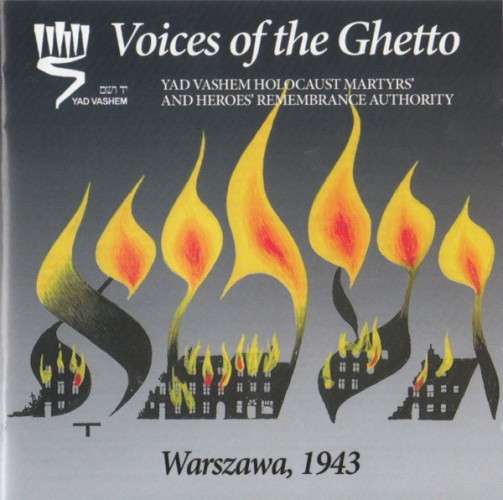
From the linernotes:
"Infomed of the Nazi plans to exteminate the Jews of Warsaw, the Jewish Resistance in the Ghetto called for a general insurection on April 19, 1943. With meager arms they fought against the tanks, planes and gas attacks of the Wehrmacht and managed to hold out for several weeks. Their uprising became the symbol of the Jewish resistance throughout the Second World War in the ghettos, camps md underground movements in all the countries where Jews were persecuted. It is to these Resistants, as well as to all victims of Nazi persecution that we wish to pay collective homage. Voices of the Ghetto: the appeal of the Jewish Combat Organization, songs of the underground, cries from the barricades, laments of the beggars and peddlers, of the hundreds who died of typhus or starvation, the voices of orphaned children and bereaved parents, of those who revolted against God and of others whose faith forbade them to question... Millions of voices, millions of lives detroyed, for no reason... When the war was over, Warsaw was a ruin and the Jewish people an open wound. In Paris, in 1993, a group of singers and musicians have sought out songs and testimonies, to remember and to bear witness- Barbary did not triumph. The Jewish people lives. "
On the morning of the 18th of January 1943, German military and auxiliary units entered the Warsaw Ghetto by surprise. The populace expected a total deportation. As opposed to the Great Deportation, during which the Jews had no knowledge of where deportees would be sent, this time the ghetto's population refused to report voluntarily. Only a small number of people responded to the Germans' calls to file into the courtyards and present their papers for inspection. The Germans tried to pick up those Jews who lacked permits, but since most had gone into hiding, they fell back to snatching people up indiscriminately.
That day, a group of fighters was caught, members of the Hashomer Hatzair movement and the Jewish Fighting Organization (ZOB). Together with other Jews they were led to the Umschlagplatz. The youths, who were still armed, albeit meagerly, dispersed among the crowd, and at a signal from Mordechai Anielewicz they attacked the Germans. In the ensuing battle there were German casualties and injuries. All the Jewish fighters were shot, and Anielewicz alone survived the battle. Another group from the Jewish Fighting Organization (members of the Dror and Gordonia movements) laid an ambush for the Germans inside the houses, and shot those who entered. These were the first organized, armed actions undertaken within the ghetto. For the first time in the history of the ghetto, Germans had come to physical harm.
By the 22nd of January only 5,000 Jews had been rounded up, among them the patients from the Jewish ghetto hospital and several members of the Judenrat. These Jews were assembled at the Umschlagplatz and deported by train.
Today we know that the January deportation was intended to be of limited proportions and that the Germans had not planned to deport all the Jews of the ghetto on this date. However, the Jews assumed that the Germans had sought to use the January deportation to empty the ghetto of its residents and send them to their destruction; they believed that their actions succeeded in obstructing this. In this way the January events turned into a watershed moment; members of the Jewish resistance organizations increased their efforts to bring about an armed uprising, while the ghetto populace at large increasingly dug underground shelters in the ghetto territory, in which they hoped to hide from the enemy forces.
01. Talila - Zog nit keyn mol 3:04
02. Jacques Grober - Ruf fun der YKO 0:27
03. Jacques Grober - Motele fun varshever geto 3:52
04. Hélène Engel - Es shlogt di sho 2:12
05. Ben Zimet - Yisrolik 3:19
06. Rosalie Becker - Lid fun umbakanten partizan 3:31
07. Franck Hagendorf - Varshever geto-lid (Ani maamin) 3:13
08. Jacques Grober - Tsen brider 1:40
09. Emile Kacmann - A din-toyre 3:28
10. Talila - Gehat hob ikh a heym 2:49
11. Jacques Grober - Mariko 2:51
12. Rosalie Becker - Yidish tango 5:16
13. Jacques Grober - Hots mitleyd 1:36
14. Rosalie Becker - Eyli, eyli 3:57
15. Ben Zimet - S dremlen feygl af di tsvaygn 3:16
16. Hélène Engel - Yeder ruft mikh Zhamele 2:26
17. Jacques Grober - Yid du partizan 1:50
18. Ben Zimet & Talila - Unter di khurves fun Poyln 4:45
19. Emile Kacman - Afn veg shteyt a boym 1:09
20. Jacques Grober & Franck Hagendorf - Mir lebn eybik 2:04
VA - Voices of the Ghetto. Warszawa, 1943
(320 kbps, cover art included)
3 Kommentare:
Thank you.
Another exceptional share by you Zero. thank you again for all your efforts
heavy on the heart and much appreciated...
Kommentar veröffentlichen